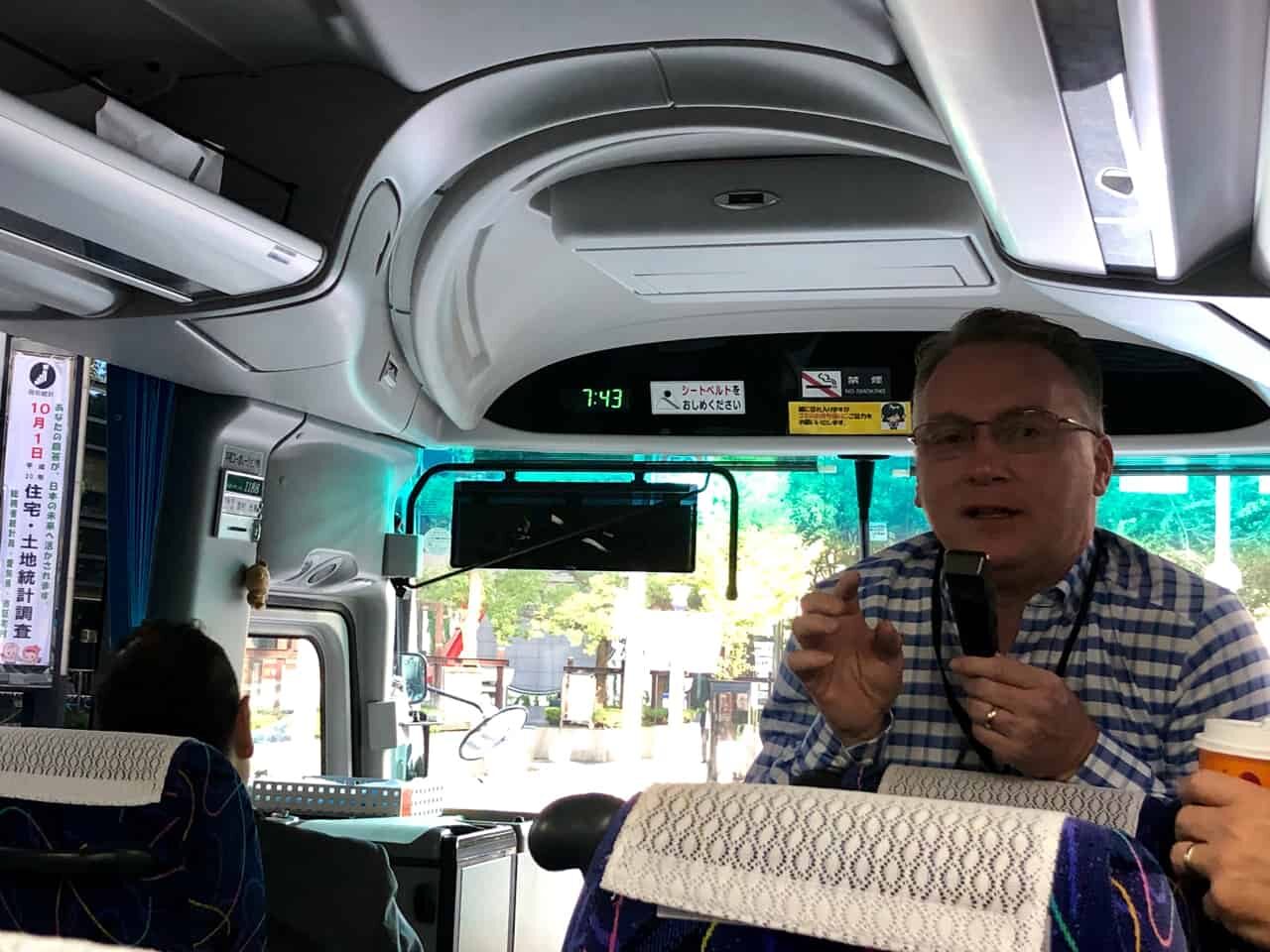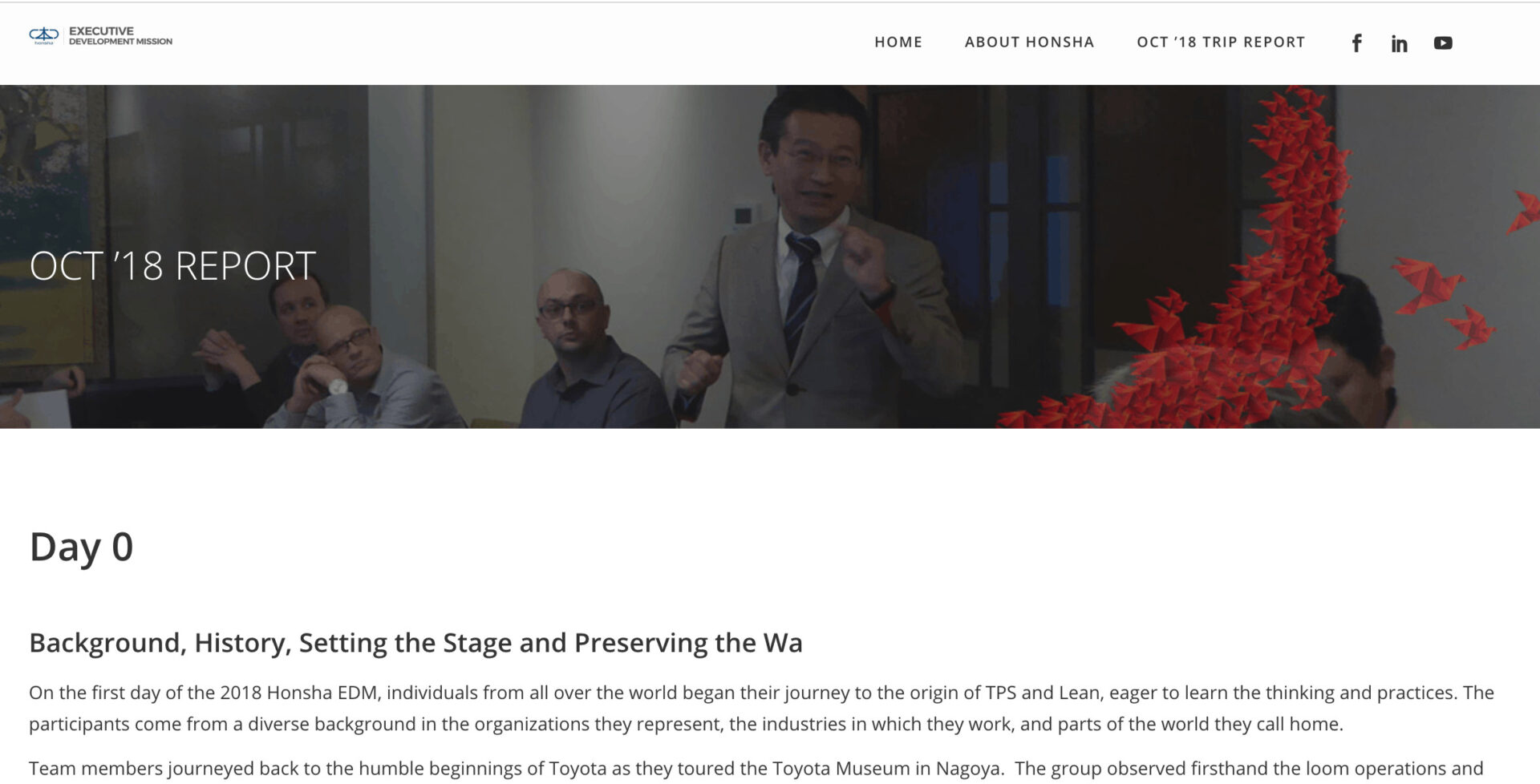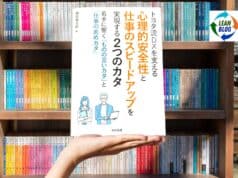When I got back from Japan a few weeks back, somebody at a hospital client of mine asked me:
“Why go back to Japan again? Haven't you been there, done that?”
Why go back to Japan? Why not go back? I learn something new and have great experiences each time and my recent opportunity to tag along with Honsha was no exception.
I'll blog more about the trip, but here's a summary of the October 2018 trip, as written by the team at Honsha:
This was my first time going with a group that wasn't exclusively from healthcare. This trip was people from manufacturing companies and a government organization from the United States. It was interesting to go back to a Toyota plant. This was my first trip where we didn't visit a hospital, so I got a deeper and more varied look at Japanese manufacturing companies (and one joint venture recycling company that took apart large home appliances and electronics for recycling).
One key takeaway is that not all Japanese companies are equally “Lean.” This is something I learned during previous trips and it was reinforced here. We visited some companies that might truly be described as “world-class manufacturers,” including some suppliers to Toyota. We visited a few organizations that are very early into their “Lean journey.”
In a truly Lean / Toyota Production System company, the work almost looks effortless. People are working, but they aren't overburdened and they're “in the zone” as some might say or “in a state of flow” as some of the former Toyota people who organized and facilitated the week's tour said.
In one factory, I watched a woman work alone in a “production cell” where her motions seemed like poetry in motion. She loaded small parts into various machines in a “U-shaped cell” and there was very little wasted motion… and the machines and parts, if they needed to wait much, waited on the worker instead of making the worker wait on the parts.
But, we saw a few facilities where work looked like more of a chore… it wasn't as easy as it could be. They still have a lot of room for improvement. They aren't magically Lean. That should be reassuring to anybody who says, “This would be easier if we were Japanese.”
Katie Anderson's post is a great take on that concept:
The Toyota Production System / Lean is a countermeasure to limiting cultural and organizational traits
That was one key takeaway from the best organizations there… the effort and engagement that goes into making work as easy as possible. In one “training Dojo” that we visited (with former Japanese Toyota leaders as instructors) had a simulated assembly area where they taught attendees how to identify waste and how to improve a work process using “Kaizen” mindsets and philosophies. 100% of the Kaizen focus was on reducing walking and other motion and improving ergonomics. If you improve the work for the worker, every other result will follow — that was the philosophy and you see the results at Toyota and other companies.
Can you imagine if healthcare organizations focused so much on making the work easier for doctors, nurses, and other staff? There would be so much benefit to the patients… if we focus on safety and quality, everything else will follow.
Anyway, I have much to share in future blog posts. Thanks again to Darril Wilburn and the entire Honsha team for allowing me to come along with them. I can't wait to go back to Japan for so many reasons — the learning, the food, the environment, and everything else. It's worth the long flights from Dallas and back and it's worth suffering through a bit of jet lag…

It's definitely worth going with Honsha. It's not just about the site visits… I gained so many insights from the Honsha consultants who were part of the group, joining us from the U.S. and Australia. The discussions on the bus and over meals really added to the experience.
Again, I highly recommend the Honsha summary of the trip…
If you've been to Japan for a Lean study trip, would you go back again? If you've gone multiple times, what did you learn in the additional journeys?
If you haven't gone, are you interested in an experience like this? What would you hope to learn? To see? To feel?
As I've written before, I've never thought you HAVE to go to Japan to understand Lean. But, if you WANT to go and have the means, I do highly recommend it. Here are some of my reflections after my first trip in 2012:
“I had always thought that going to Japan might be useful, but it wasn't necessary. It's not a “must do” trip. I thought one would probably learn a lot by going, and it could be fun, but it wasn't necessary. You could do a great job in Lean without that experience, I said. I didn't encourage it and I didn't discourage it.
Maybe I was rationalizing that I didn't have a big gap in my Lean understanding because I've been learning and practicing this for 20 years without going to Japan. But, I've learned from many who came from Japan, visited Japan, and worked there. Maybe that was good enough.
I decided to give it a try – and loved it!
But, I tell you, I became tempted and wanted to go to Japan. I didn't feel like I NEEDED to go to Japan to study Lean. But, I decided I WANTED to go. I was curious about the country, especially Tokyo. I wanted to see the rural surroundings of Toyota City. I wanted to learn the differences, if I could, between “Lean Culture” and “Japanese Culture” (and our guides helped us understand the difference).”
Thinking back, so much of my first trip was spent in the zone of “Wow! Japan!” It's new and disorienting… with some Lean lessons and first impressions. To me, there is always a bit of a “gee whiz” factor when in Japan, but I think the additional trips provided the opportunity to gain deeper insights, to look for patterns, and to be continually surprised and delighted…
What do you think? Please scroll down (or click) to post a comment. Or please share the post with your thoughts on LinkedIn – and follow me or connect with me there.
Did you like this post? Make sure you don't miss a post or podcast — Subscribe to get notified about posts via email daily or weekly.
Check out my latest book, The Mistakes That Make Us: Cultivating a Culture of Learning and Innovation:











I think you can learn as much about truly operationalized Lean from spending a day in most laser eye surgery clinics than you could most manufacturing companies in Japan. You can also learn more about Lean Design by touring a WWII submarine than you could by touring most “lean” hospitals.
I never really got the appeal of the whole Japan lean tour thing because there are so many great examples of effective process improvement within 50 miles of wherever you happen to be. And most of the leadership teams in those places are usually more than happy to freely share their best practices and lessons learned (unless you’re in a competitive position).
As I’ve said before, if you go to Japan, you’re flying over 5,000 other companies doing amazing things in efficiency and effectiveness. Seems like too much of an opportunity cost.
Hi Robert — Yeah, I’ve never been one to say one “has” to go to Japan. Even after going, my advice to people has been “if you want to go and you can afford to… then go for it, you can learn something.”
We have Seattle hospitals traveling to Japan to learn from factories there. Then, some Japanese hospitals have flown to Seattle to learn from those hospitals. It begs the question of why the Japanese hospitals don’t just cut out the middleman and visit Toyota and other factories in Japan?